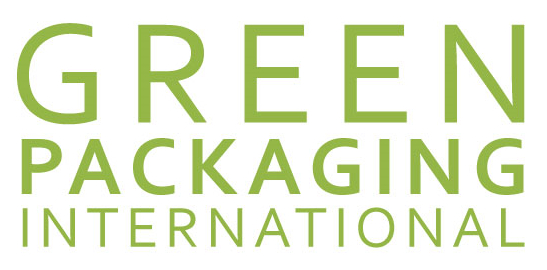Super User
Anchor Glass Rejoins The Glass Packaging Institute (GPI)
Anchor Glass and GPI membership align to strengthen glass sustainability leadership
The Glass Packaging Institute (GPI) is pleased to announce that Anchor Glass Container Corporation is rejoining the association as a full member.
Anchor Glass, headquartered in Tampa, Florida, is the third largest North American glass manufacturer of premium glass packaging products with six U.S. locations that serve the South, Northeast and Midwest regions.
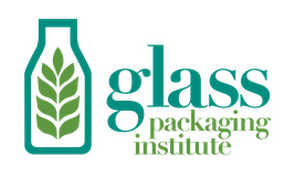 “For the first time in many years, we have all the major U.S. glass manufacturers and their major suppliers working together on common issues and opportunities in the glass industry," said Bertrand Paulet, CEO of Ardagh Glass North America and Chair of the GPI Board of Directors. “I am pleased to welcome Anchor to GPI and we look forward to leveraging our capabilities to increase glass recycling and promote the many benefits of glass as a sustainable and environmentally friendly package.”
“For the first time in many years, we have all the major U.S. glass manufacturers and their major suppliers working together on common issues and opportunities in the glass industry," said Bertrand Paulet, CEO of Ardagh Glass North America and Chair of the GPI Board of Directors. “I am pleased to welcome Anchor to GPI and we look forward to leveraging our capabilities to increase glass recycling and promote the many benefits of glass as a sustainable and environmentally friendly package.”
“Anchor Glass is excited to rejoin GPI,” said Anchor Glass President and CEO Nipesh Shah. “As a premier glass packaging solution provider, we look forward to working together on industry issues and promoting glass as the packaging material for consumers.”
“We are delighted that Anchor Glass is rejoining as a member,” said GPI President Scott DeFife. “Anchor Glass supports the sustainable manufacture of glass containers, and supplies a number of industry brands and customers across the food and beverage end markets. We look forward to working together in support of our mutual efforts to leverage glass packaging’s infinite recyclability for a circular economy across the country.”
To learn more about GPI’s member companies and how we serve them, visit our website.
About Anchor Glass
Anchor Glass is a leading North American manufacturer of premium glass packaging products. Anchor Glass has long-standing relationships with blue chip companies across the beer, liquor, food, beverage, ready-to-drink, and consumer end-markets. The Company employs approximately 1,700 people and operates six glass manufacturing facilities located in Florida, Georgia, Indiana, Minnesota, New York, and Oklahoma. For more information, please visit www.anchorglass.com.
About the Glass Packaging Institute
Founded in 1919 as the Glass Container Association of America, the Glass Packaging Institute (GPI) is the trade association representing the North American glass container industry. On behalf of glass container manufacturers, GPI promotes glass as the optimal packaging choice, advances environmental and recycling policies, advocates industry standards, and educates packaging professionals. Follow GPI on Twitter and Facebook, and connect with us on LinkedIn for updates on all things glass. Learn more at www.gpi.org
DS Smith Launches New Sustainability Strategy – ‘Now and Next’
DS Smith reinforces commitment to the circular economy with ambitious two-phase sustainability strategy
DS Smith, the FTSE 100 leading provider of sustainable packaging, has just launched its new sustainability vision and strategy, Now and Next, which maps out ambitious commitments and goals for the next decade.
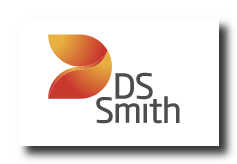 Through its innovative two-phased Now and Next approach, DS Smith will continue to focus on the transition to a circular economy by partnering with customers, communities, governments and influencers to keep materials in use, design out waste and regenerate natural systems. It will continue to focus on CO₂ reduction, protecting biodiversity and reducing water consumption.
Through its innovative two-phased Now and Next approach, DS Smith will continue to focus on the transition to a circular economy by partnering with customers, communities, governments and influencers to keep materials in use, design out waste and regenerate natural systems. It will continue to focus on CO₂ reduction, protecting biodiversity and reducing water consumption.
Miles Roberts, Group CEO of DS Smith commented: “As we respond to the changing world in which we live and operate, it is critical that our drive to redefine packaging continues to place circularity at the heart of our business. Our new strategy allows us to move beyond just having a strong circular business model ourselves to delivering more circular solutions for our customers and wider society – replacing problem plastics, taking carbon out of supply chains and providing innovative recycling solutions.”
The strategy sets out four key pillars, alongside a continued commitment to reduce CO₂ emissions by 30% against a 2015 baseline and care for its forests and biodiversity wherever it operates. The key areas of the strategy will drive sustainable growth at DS Smith through its ambitious targets:
- Closing the loop through better design – By 2023, it will manufacture 100% reusable or recyclable packaging and its aim is that by 2030 all of its packaging will be recycled or reused
- Protecting natural resources by making the most of every fibre – By 2025, it will optimise fibre use for individual supply chains in 100% of its new packaging solutions and by 2030 it aims to optimise every fibre for every supply chain
- Reducing waste and pollution through circular solutions – By 2025, it will take 1 billion pieces of problem plastics off supermarket shelves, take 250,000 lorries off the road and work with partners to find solutions for ‘hard to recycle’ packaging. Meanwhile, by 2030 it aims to use packaging and recycling to enable the circular economy by replacing problem plastics, reducing customer carbon and eliminating consumer packaging waste
- Equipping people to lead the transition to a circular economy – By 2025 it will engage 100% of its people on the circular economy and by 2030 it will engage 5 million people on the circular economy and circular lifestyles.
Wouter van Tol, Head of Sustainability, Community and Government Affairs commented: “Now and Next positions DS Smith at the forefront of the packaging industry and sets a clear roadmap to address immediate challenges, while also working to meet the needs of the next generation by creating solutions that are aligned with the principles of the circular economy. By taking a whole systems approach, we have a huge opportunity to make significant progress against our environmental, social and governance responsibilities.”
Following measurable progress against its nine long-term sustainability goals, the Now and Next Sustainability Strategy has been introduced as part of a strategic review and vision to be the leading supplier of sustainable packaging. In the past year, DS Smith hit a number of sustainability milestones including an 11% reduction in emissions in 2019 compared to 2015 on a like-for-like basis and 100% engagement in community programmes across its site employing more than 50 people.
An international packaging company, it produced over 17 billion boxes in 2019/20 and is Europe’s largest cardboard and paper recycler, managing 6 million tonnes per year, making it a net positive recycler. DS Smith is one of only 16 Strategic Partners of the Ellen MacArthur Foundation – the recognised global authority on the circular economy.
About DS Smith:
DS Smith is a leading provider of corrugated worldwide, supported by recycling and papermaking operations. Headquartered in London and a member of the FTSE 100, DS Smith focuses on creating innovative sustainable packaging solutions in 34 countries employing around 30,000 people. Using the combined expertise of its divisions – including Packaging, Recycling, Paper – DS Smith works with customers to deliver solutions that reduce complexity and deliver results throughout the supply chain. Its history can be traced back to the box-making businesses started in the 1940s by the Smith family.
The Paper Freezer Pack: A Novel Use for Wood Fiber
Accelerated by recent events, e-commerce sales continue to boom as today’s consumers purchase more of the products they use every day online — from the clothes they wear to the meals they eat. Unfortunately, this has increased concerns about unnecessary packaging waste and ever-greater levels of plastic pollution. Enter the paper freezer pack, which may one day replace plastic freezer packs for use in shipping refrigerated products.
A Better Way To Chill
While great strides have been made to reduce the environmental burden of e-commerce packaging over the years, the traditional freezer pack remains both a pain point for meal kit customers and an area ripe for innovation.
Domtar’s Catapult team, which includes individuals from market development and new technology innovation process, focuses on uncovering, tracking and evaluating the attractiveness of emerging market opportunities. The team recently revealed its paper freezer pack, an internally-developed potential solution to the issues posed by conventional cold chain offerings. Not only does the pack reduce plastic use, but it also capitalizes on mounting public interest in products made from sustainable wood fiber.
The majority of this revolutionary paper freezer pack is made of forest-derived fiber, including paper, tissue and fluff pulp. It also includes a small amount of superabsorbent polymer, which absorbs and retain water that, once frozen, provides cooling properties.

Innovative Paper Freezer Pack Captures Attention
“Paper freezer pack technology is but one example of several promising projects that the Catapult team is involved in related to innovative fiber-based processes and products,” says Brian Ranson, Domtar’s director of technology innovation.
In fact, this technology is so unique that it was recently named a finalist for the prestigious Sustainable Packaging Coalition (SPC) Innovator Awards. When announcing the finalists, the packaging collaborative said it was impressed by the paper freezer pack’s innovative use of fiber in a growing category while also challenging preconceived notions of what’s possible with paper packaging.
Our preliminary in-house testing has shown that our paper freezer pack technology:
- Can hold its temperature similar to conventional options at a lighter weight
- Demonstrates no leakage
- Exhibits minimal condensation versus conventional packs
Rather than manufacture and convert the paper freezer packs internally, we are in active conversations with leading e-commerce solutions providers that are seeking to capture the value of this patent-pending technology while sourcing more of their packaging from a renewable resource.
“By utilizing market research to develop insights and deepen end-user understanding, Domtar realizes that it can better satisfy current customers while at the same time ‘testing the waters’ with innovative new ones,” says Katie Zorn, director of strategic planning and market development.
Learn more about our paper freezer pack and its innovative use of responsibly sourced wood fiber:
The Reusable Paper Bag, a better choice for the climate
There are more and more reasons to replace the plastic Bag for Life with one in paper when you go shopping. BillerudKorsnäs and AB Group Packaging therefore proudly present the reusable paper bag, one of the world´s strongest paper bags now available in UK Supermarkets.
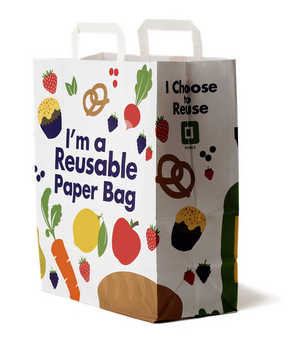 The secret behind the power of the Reusable Paper bag is the raw material called FibreForm®“RPET, fabric or PP reusable bags have long been available for consumers but can now be replaced by a Reusable bag made of FibreForm®, says Veronica Fylkner, Sales Manager, Formable Solutions at BillerudKorsnäs.
The secret behind the power of the Reusable Paper bag is the raw material called FibreForm®“RPET, fabric or PP reusable bags have long been available for consumers but can now be replaced by a Reusable bag made of FibreForm®, says Veronica Fylkner, Sales Manager, Formable Solutions at BillerudKorsnäs.
“FibreForm® is one of the strongest kraft papers in the world. It’s been on the market for a while and we are still exploring its full potential. We see several new applications we can develop with FibreForm® and we are eager to replace less sustainable materials and solutions. It is a journey that we are pleased to be on as we can help decrease the amount of plastics and aluminium in different applications on the market” says Veronica Fylkner.
Laboratory tests have shown that the reusable paper bag can be reused over and over again.
“We tested one bag until breakdown and it lasted 43 cycles which is equivalent with 860 lifts and this with a high weight of 16 kg. We can really say that FibreForm® is suitable for reuse in all types of weather.” says Veronica Fylkner.
Today AB Group Packaging who manufactures in Ireland, the UK and Spain, is offering the ultra-strong paper bag to several major supermarkets in the United Kingdom. Compared to several other European countries, paper bags have not been an option in most UK retail stores, until recently.
The reason behind this have been due to cost, strong plastic industry and some misperceptions that papers are weak and have higher climate impact. With good virgin paper from integrated paper mills you actually can crush both of those myths.
“We are really pleased to be working with BillerudKorsnäs - which we have done now for about 30 years. They are number one in all categories.” says Dermot Brady, Inc. founder and CEO at AB Group Packaging.
AB Group Packaging have developed this ultra-strong bag with one of the strongest papers from BillerudKorsnäs. The aim has been to launch a re-usable paper bag, and AB Group Packaging have some of the largest clients on-board to make this change.
“Reduce, reuse, recycle – this is my vision of how the industry should operate in the future. We are responsible for every product we put on the market, all should be renewable. We want zero negative influence when producing and using our products and we are so pleased to be able to offer this product to the market.” says Dermot Brady.
The future bag is one step towards a sustainable future is to abandon plastic bags and use bio-based and 100% recyclable material. A common misunderstanding on the market is that paper have a higher impact on the climate than plastic. Several studies have shown that BillerudKorsnas packaging materials have a lower climate impact than other materials. When the Swedish environmental institute IVL made a life cycle assessment on a BillerudKorsnäs standard paper for carrier bags, the paper actually had lower climate impact than bio-based plastic, recycled plastic and fossil based plastic. The material used by AB Group Packaging for the supermarket chains in the UK is BillerudKorsnäs FibreForm® Kraft Paper – attaining both environmentally friendly criteria’s above.
The uniqueness of FibreForm® is the high stretch, and how tear resistant and strong it is.
For several types of strong paper bags normal kraft paper is enough, but if you want that extra level of strength to be able to reuse the bag several times - FibreForm® is a good option.
“The world is now ready for a shift - from plastics to renewable bio-based products.” says Dermot Brady.

https://www.billerudkorsnas.com/sustainability/life-cycle-assessment-and-environmental-product-declarations
If you would like to know more about BillerudKorsnäs different strong kraft papers please take at our homepage.
https://www.billerudkorsnas.com/our-offer/packaging-materials/
BillerudKorsnäs provides packaging materials and solutions that challenge conventional packaging for a sustainable future. We are a world-leading provider of primary fibre based packaging materials and have customers in over 100 countries. The company has 8 production units in Sweden, Finland and the UK and about 4500 employees in over 13 countries. BillerudKorsnäs has an annual turnover of about SEK 24 billion and is listed on Nasdaq Stockholm. www.billerudkorsnas.com
ANTALIS TO OFFER ENTRY LEVEL AIR CUSHIONING MACHINE
The Master’In Air Cushioning Machine (A-200 AC) is a compact and cost-effective solution for ecommerce/online shops and small to medium sized businesses looking to improve their packing process and keep up with demand levels.
The machine produces cushioning and void fill on demand, as it’s needed, allowing users to free up valuable space where bulky cushioning materials were previously stored. It will also leave more space for your employees to operate safely in.
It is a simple, low noise, plug and play installation machine that is lightweight so can be easily moved around the packing area as needed. It is very user-friendly and easy to operate and maintain with low maintenance and spare parts costs.
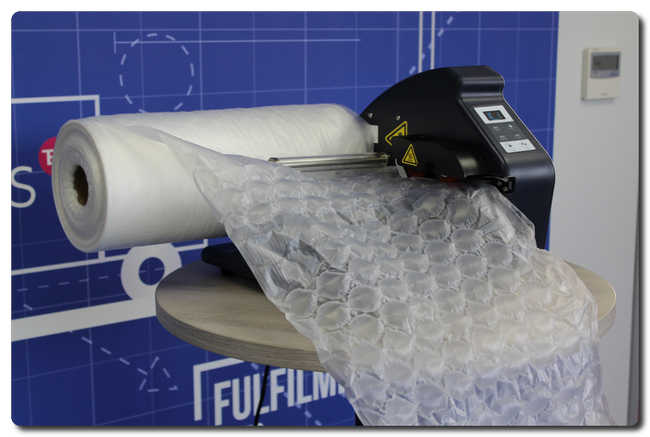 Master'In Air Cushioning Machine (A200 AC)
Master'In Air Cushioning Machine (A200 AC)
Stuart Bates, Solutions Sales Manager Antalis said, “As we approach the traditional ‘peak’ shopping period, there will be a ‘peak like no other’. Many businesses have been so focused on dealing with the unexpected surge in online sales generated by COVID-19 that they may have ‘taken their eye of the ball’ when it comes to what’s around the corner. This machine is an ideal addition to any packing line during busy periods because of the efficiency and space saving benefits - as well as helping to futureproof the business.”
“The Master’In Air Cushioning Machine is one of many independent machinery solutions we have at Antalis Packaging. We offer free audits whereby we review your packaging operation and make recommendations on the kinds of improvements and investments that can be made,” added Stuart
About Antalis
Antalis (Euronext Paris: ANTA) is the leader in B2B distribution of Papers (number 1 worldwide outside the United States) and industrial Packaging, and number two in the distribution of Visual Communication media in Europe. In 2019, the Group reported sales of €2.1 billion and employed 4,700 people serving over 115,000 customers, companies and printers in 39 countries. Through its 117 distribution centres, Antalis makes around 11,000 deliveries per day worldwide and it distributed 1.1 million tons of paper in 2019.
VPK Group NV and Encase Ltd reach acquisition agreement
VPK Group came to an agreement with COPI Holding to buy Encase Ltd, manufacturer and designer of corrugated cardboard packaging. Encase Ltd operates two integrated corrugated packaging plants in England and one sheet plant in Scotland. It is VPK’s intention to merge Encase with its UK corrugated operations, formerly known as Rigid.

Two decades of continued business growth
VPK’s corrugated operations in UK and Ireland, formerly known as Rigid Containers and recently rebranded as VPK Packaging, experienced impressive and consistent yearly growth since it entered the VPK Group in 2000. Under its ownership, VPK invested more than £100 million into the division. Desborough was transformed into the UK flagship site, whereas greenfield sites in Wellington and Selby gradually increased capacity to fully mirror operations on all three sites.
In 2015, the acquisition of ICS Europaks in Limerick, Ireland, further strengthened the geographical spread. With a strong focus on high quality printing capacities, the UK and Ireland divisions enjoy a solid reputation with high service requirement customers. Earlier this year, VPK acquired a majority stake in Corrboard UK Ltd, a leading supplier of corrugated cardboard sheets located in Scunthorpe, operating a 320,000 sq ft modern factory and equipped with a new fast order-change Fosber 2.80m corrugator, using a CO2 neutral production process.
As part of its long-term strategy, it is now VPK’s intention to fully merge Encase with the existing VPK UK corrugated operations. The combined businesses are expected to achieve yearly sales of more than 200 million GBP in corrugated packaging and sheets. All six corrugators combine a yearly containerboard consumption of 300.000 Tons, which represents a major part of the non-integrated recycled containerboard consumption in UK.
VPK has a proven track record of successful investments and acquisitions in corrugated manufacturing assets. These include four sheet feeding plants in Poland and Germany – known under the brand name Aquila, an ultra-modern greenfield investment project in Halden (Norway) which was recently put into operation and the acquisition of Viallon Emballages in France. With regards to containerboard production, the pioneering conversion in Strasbourg, France, of the former UPM Stracel assets by Blue Paper, set a new standard for the recycled containerboard industry.
About VPK Group
VPK produces recycled paper, corrugated cardboard packaging, solid board packaging and cores. In addition to VPK Packaging, VPK Group’s overall brand portfolio includes Corex for core board, cores and tubes production and Smart Packaging Solutions for the production of solid board packaging. Employing over 6200 people across 65 locations in 20 countries, the group records a turnover of €1.5 billion. For more information about our activities please visit: www.vpkgroup.com.
About Encase
Encase is a family owned business established in the UK during the 1960’s and is now one of the UK’s largest independent multisite manufacturers of corrugated packaging. Encase operates two integrated corrugated packaging plants in England and one sheet plant in Scotland.
Why manufacturing environmentally friendly packaging and paper is essential for the future
As a new age of consumer behaviour emerges, and governments are distracted by the pandemic - environmental concerns have fallen from the political and public agenda.
The dramatic increase in e-commerce and home deliveries has caused a sharp rise in packaging waste, which comes with high environmental costs. At current rates, 12 billion metric tons of plastic waste will end up in landfill and the natural environment by 2050[1]. As countries experience further restrictions on movement and a second wave of Covid-19, consumer behaviour is unlikely to rapidly revert to its pre-lockdown state.
 Kaushal ShahHence, sustainable packaging and paper solutions must be adopted so the global community can protect the planet effectively. There is no time to waste.
Kaushal ShahHence, sustainable packaging and paper solutions must be adopted so the global community can protect the planet effectively. There is no time to waste.
Plastics are the most common and wide-ranging materials used for packaging. They are central to FMCG and global industrial supply chains, protecting goods in transit and extending their shelf lives. Their ubiquity means a serious plastic packaging waste crisis must be addressed before irreversible damage is done.
According to the UN, 300 million tonnes of plastic waste are produced every year. Since the early 1950s, 8.3 billion tonnes of plastic has been produced and c. 60% has ended up in landfill or the natural environment[2].
Plastic waste is a primary contributor to global ocean pollution with rivers carrying waste from far inland to the sea. Each year, eight million tonnes of plastic ends up in the world’s oceans and 100 million marine animals die from entanglement, ingestion, or interaction with this waste[3]. The Ellen MacArthur Foundation estimates that, by 2050, there could be more plastic than fish in the sea[4].
The issue extends beyond the environment; plastic waste comes with a significant human cost. In 2019, Tearfund, Fauna & Flora International and Waste Aid reported between 400,000 and one million people die each year from preventable diseases linked to mismanagement and burning of plastic waste in developing countries[5].
Plastic waste pollution also impacts people’s livelihoods and the economic development of developing countries. The UN Environment Programme reports ocean-based plastic pollution has an annual economic cost of US$13 billion due to revenue losses in fisheries, agriculture, and tourism[6].
We have a collective responsibility to tackle this plastic pollution crisis. The environmental and human toll is too great to ignore. Sustainable alternatives to traditional packaging and paper exist. It is time for multinationals, manufacturers, and retailers to integrate them into their working practices to help reduce global pollution; protect marine and wildlife species; and those in developing countries.
The growing consumer awareness of this crisis is promising. A recent study of 2,000 UK shoppers revealed 62% are thinking more about sustainability now than five years ago and increasingly looking for environmentally friendly options[7].
Popular culture is also playing a major role in raising awareness of packaging choices. Notably, David Attenborough’s ‘Blue Planet II’ series focused on ocean waste and triggered a passionate global response. Consumers are more aware nowadays that a product’s lifecycle does not end after consumption – rather after its proper disposal.
Nonetheless, the pandemic and the new normal means individuals are more reliant on e-commerce and delivery services than ever before. Manufacturing environmentally friendly packaging and paper is therefore essential. It will help protect the planet and maintain business profitability as consumers increasingly look for eco-friendly choices.
Political and tax incentives for incorporating environmentally friendly packaging and paper are also evident. From 1 January 2021, the EU will tax non-recycle packaging waste through national contributions. In April 2022, the UK will introduce a tax on plastic packaging containing less than 30% recycled content. These plastic reduction policies and public appetite make environmentally friendly packaging and paper attractive for business.
Manufacturing environmentally friendly packaging and paper is vital for the future – on an environmental, human, and corporate level. There is no time to waste.
[1] https://www.ncbi.nlm.nih.gov/pmc/articles/PMC7324921/
[2] https://www.unenvironment.org/interactive/beat-plastic-pollution/#
[3] https://www.condorferries.co.uk/marine-ocean-pollution-statistics-facts#
[4] https://www.ellenmacarthurfoundation.org/assets/downloads/New-Plastics-Economy_Catalysing-Action_13-1-17.pdf
[5] https://wasteaid.org/wp-content/uploads/2019/05/2019-Tearfund-Consortium-No-time-to-waste-En.pdf
[6] https://wasteaid.org/wp-content/uploads/2019/05/2019-Tearfund-Consortium-No-time-to-waste-En.pdf
[7] https://www.talkingretail.com/news/industry-news/time-to-prioritise-eco-friendly-packaging-say-shoppers-in-new-survey-13-10-2020/#
Latest Packaging Addition from EcoCortec®
Combine Multimetal Corrosion Protection and Packaging into One Step with CorrTube!
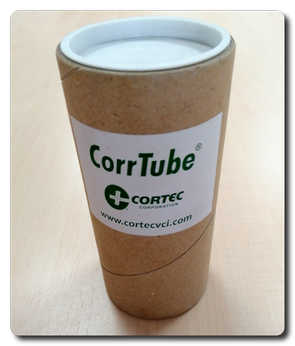 EcoCortec®, Croatian anti-corrosion films plant has expanded its selection of anti-corrosion packaging for industrial and military uses with CorrTube, a premium corrosion inhibiting packaging and shipping tube in the industry. CorrTube provides superior corrosion protection for both ferrous and non-ferrous metals. This environmentally safe product is fully recyclable/repulpable and can be recycled into other types of paper products such as boxes, cardboard and other corrugated materials. CorrTube is environmentally friendly, non-toxic, biodegradable and doesn’t contain any nitrites, phosphates, silicates or other hazardous compounds. Tubes are very easy to use, simply match the appropriate diameter of the tube to the size of your part.
EcoCortec®, Croatian anti-corrosion films plant has expanded its selection of anti-corrosion packaging for industrial and military uses with CorrTube, a premium corrosion inhibiting packaging and shipping tube in the industry. CorrTube provides superior corrosion protection for both ferrous and non-ferrous metals. This environmentally safe product is fully recyclable/repulpable and can be recycled into other types of paper products such as boxes, cardboard and other corrugated materials. CorrTube is environmentally friendly, non-toxic, biodegradable and doesn’t contain any nitrites, phosphates, silicates or other hazardous compounds. Tubes are very easy to use, simply match the appropriate diameter of the tube to the size of your part.
The VpCI® coating on the inside or the tube vaporizes, reaching all metal surfaces to provide complete corrosion protection. The unique inhibiting action of VpCI® forms a thin effective protective layer that does not alter the appearance of products or require removal before further finishing or use.
CorrTube protects dry or oiled metals during storage, transit and overseas shipment. It is effective against aggressive environments including humidity, SO2, H2S, and galvanic corrosion from dissimilar metals. Protective layer does not need to be removed prior to further surface finishing or coating application.
The typical applications are:
- Raw barstock
- Cylindrical and rod-like parts
- Gears
- Bearings
Cortec® Corporation is the global leader in innovative, environmentally responsible VpCI® and MCI® corrosion control technologies for Packaging, Metalworking, Construction, Electronics, Water Treatment, Oil & Gas, and other industries. Our relentless dedication to sustainability, quality, service, and support is unmatched in the industry. Headquartered in St. Paul, Minnesota, Cortec® manufactures over 400 products distributed worldwide. ISO 9001, ISO 14001:2004, & ISO 17025
DS Smith Targets 30% Reduction of Carbon Emissions by 2030 in Partnership with World Kinect Energy Services
Energy management partnership to drive sustainability goals at packaging provider
DS Smith, the FTSE 100 leading provider of sustainable packaging, has just announced a new partnership with World Kinect Energy Services to manage energy consumption for its Recycling, Paper and Packaging sites across 26 European countries.
World Kinect Energy Services will support the DS Smith’s long-term goal to reduce carbon emissions by 30% by 2030, in line with the reaffirmation of that target in the company’s newly launched Now and Next Sustainability Strategy. With a large focus on the company’s 14 European paper mills, the partnership will provide DS Smith with tactical solutions to energy purchasing and usage, increasing efficiencies and reducing waste in production.
Adding value to DS Smith’s existing energy portfolio, World Kinect Energy Services will support the company to mitigate risks and maximise its energy data through price risk management services including market intelligence, regulatory reporting, and cost and consumption reporting. The partnership will continue to ensure a competitive strategy for total energy costs across all its European markets.
 Terry Cogan, vice president, World Kinect Energy ServicesGerald Maunz, Procurement Director for Energy at DS Smith commented: “
Terry Cogan, vice president, World Kinect Energy ServicesGerald Maunz, Procurement Director for Energy at DS Smith commented: “
“As a global business with sustainability as the foundation of our overall business strategy, being able to manage energy consumption efficiently across all our sites is fundamental. We were impressed with the professionalism, price risk management skills and reporting capabilities that the energy experts and portfolio management team at World Kinect Energy Services demonstrated.”
 Gerald Maunz, Procurement Director for Energy at DS Smith Terry Cogan, Vice President at World Kinect Energy Services added: “All our customers have differing requirements, whether it’s specific financial or reporting processes, or sustainability and carbon reduction targets and it is our priority to ensure those needs are met. We are looking forward to working with the team at DS Smith over the next three years to help them maximise their energy data and exploit it to manage and minimize risks in what is a complex and volatile market.”
Gerald Maunz, Procurement Director for Energy at DS Smith Terry Cogan, Vice President at World Kinect Energy Services added: “All our customers have differing requirements, whether it’s specific financial or reporting processes, or sustainability and carbon reduction targets and it is our priority to ensure those needs are met. We are looking forward to working with the team at DS Smith over the next three years to help them maximise their energy data and exploit it to manage and minimize risks in what is a complex and volatile market.”
In the past year, DS Smith has hit a number of sustainability milestones including an 11% reduction in emissions in 2019 compared to 2015 on a like-for-like basis. The partnership with World Kinect Energy Services will drive this momentum, ensuring significant progress is made against key sustainability targets.
About DS Smith:
DS Smith is a leading provider of corrugated packaging, supported by recycling and papermaking operations. Headquartered in London and a member of the FTSE 100, DS Smith focuses on creating innovative sustainable packaging solutions in 34 countries employing around 30,000 people. Using the combined expertise of its divisions – Packaging, Recycling and Paper – DS Smith works with customers to deliver solutions that reduce complexity and deliver results throughout the supply chain. Its history can be traced back to the box-making businesses started in the 1940s by the Smith family.
About World Kinect Energy Services
World Kinect Energy Services is a trusted global leader in energy management, fuel supply, and sustainability. It helps clients buy better and buy smarter energy through the delivery of trusted energy advice and solutions, sustainability services and data management.
Its four core solutions include:
- Energy Management
- Sustainability
- Brokerage
- Supply & Trade
With more than 5,000 industry experts and dedicated account managers based in North America, Europe, and Asia, it manages over 200 TWh of power and gas.
Find out more about our services here www.world-kinect.com
Saica Group to break ground on new plant
Local and state officials to welcome new manufacturing facility in Hamilton
Saica Group has held a groundbreaking event at the site of its first U.S. plant, 2995 McBride Court, Hamilton Enterprise Parkway in Hamilton, Ohio. The 350,000 square-foot plant will manufacture corrugated packaging. The project marks Spanish company Saica’s expansion into the U.S. market, and represents a $72-million investment.
Because of COVID-19 concerns, in-person attendance at the event was limited, but several regional government officials were on hand to welcome Saica to the region, while others joined via video messages. Cincinnati-based Miller-Valentine Group is building the project.
“This event marks the start of ambitious expansion plans for the U.S. market,” said Saica Group President Ramón Alejandro. “We’re excited that this day is here, and truly appreciate the support we’ve received from our partners here in the U.S.”

State and local incentives are supporting Saica’s investment in Hamilton. In June, the Ohio Tax Credit Authority approved an eight-year job creation tax credit to build the new facility in Hamilton.
JobsOhio is supporting the project through an economic development grant and a JobsOhio Workforce Grant. The project also will receive a job creation tax credit and property tax abatement by the city of Hamilton.
“We’re happy to see this project moving forward,” J.P. Nauseef, JobsOhio CEO. “Saica Group is a great fit for this region, and this plant will help create opportunities in Hamilton and beyond.”
REDI Cincinnati also supported this project, and credits collaboration between JobsOhio and the city of Hamilton for successfully attracting Saica to the region.
“Saica selecting our region is the direct result of several organizations working together to bring manufacturing jobs here,” said Brandon Simmons, REDI Cincinnati vice president of project management. “I look forward to seeing the company thrive as it expands to the U.S.”
Saica Group expects to create 64 new jobs in the region, including 27 skilled operators, 15 manufacturing, engineering and supply chain professionals, 13 sales staff and nine office and management jobs.
Miller-Valentine is partnering with Phoenix Architecture, Advantage Engineering, Genesis Design and Terracon Consultants to complete this project.
To know more about the project, you can visit: https://usa.saica.com/en/
About Saica Group
Saica Group is one of the largest European players in the development and production of recycled paper for corrugated board, with a production of 3.5 million of short tons of paper. With more than 10,000 employees across Spain, France, Italy, Portugal, United Kingdom, Ireland, Turkey, Luxembourg and The Netherlands; Saica Group has four business areas: production of recycled paper for corrugated board (Saica Paper), waste management and environmental services (Saica Natur), production of corrugated packaging (Saica Pack) and flexible packaging (Saica Flex). The consolidated turnover of the multinational is nearly 3.4 billion dollars (consolidates sales, 31.12.19).
Learn more at www.saica.com
